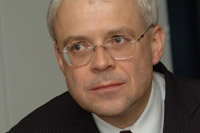Europe's shadow economy not decreasing

European Union officials on Wednesday urged to crack down Europe's shadow economy.
Vladimir Spidla, the EU's employment chief, said Europe's black market economy "undermines the financing" of national social security programs and hinders efforts to boost economic growth.
"There are no signs that the phenomenon is decreasing. Indeed in certain sectors and certain forms of work it appears to be growing," Spidla said. "We need to step up our approach and take more decisive action across the EU."
He said more legal jobs could be created if EU governments reduce the tax burden on labor and high social security contributions taken off salaries, wages and overtime payments.
Spidla said undeclared work could be further reduced if more member states lift restrictions on eastern European migrant workers, many of whom continue to be banned from moving to older EU member nations to seek legal employment. To prevent migrants from flooding their labor markets, older member countries insisted on transitional rules imposed on the EU's newest members when they joined the bloc in 2004 and 2007.
Spidla said better controls and checks on companies should also be undertaken.
The EU appeal was backed by an EU survey that found almost a quarter of the EU's 500 million citizens have at some point been involved in undeclared work, either by paying for it or working for cash. On average, 5 percent of the 26,755 people who participated in the EU questionnaire said they carried out undeclared work last year.
The survey said a complete analysis of the problem across Europe could not be made, because many of those asked refused to answer more touchy issues and many of those surveyed did not consider paying cash for such things as baby-sitting or housecleaning illegal.
The poll found that retail goods like DVDs, computers, clothing and furniture were the most popular black market goods. The second most popular were household services like childcare and gardening, followed by construction and repair services.
Spidla said the largest shadow economies were in eastern and southern Europe, notably in Bulgaria, Romania and Italy. However, the survey found that Danes freely acknowledged to carrying out the highest percentage of undeclared work last year - at 18 percent - followed by Latvians at 15 percent. British and Cypriot participants had the lowest rates, between 2 and 1 percent, respectively.
The EU survey was conducted between May and June this year and had a margin of error of plus or minus 3.1 percentage points.
Subscribe to Pravda.Ru Telegram channel, Facebook, RSS!


